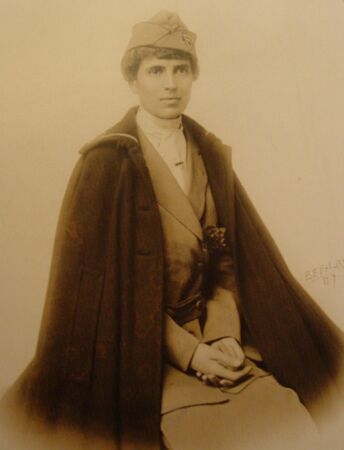
R. Louise Fitch, Knox College, was born on September 27, 1878 in Galva, Illinois. She graduated from Galva High School and attended Knox College in Galesburg, Illinois, where she was initiated as a member of Epsilon Chapter in 1899. She graduated from Knox with honors in 1902.
At Tri Delta’s fifth Convention, Fitch advocated for the establishment of a visiting delegate program for collegiate and alumnae chapters, and in 1904, she was appointed Tri Delta’s first visiting delegate. In this role, she performed the first complete inspection of Tri Delta’s collegiate and alumnae groups, visiting 22 collegiate chapters, 10 alliances, and 3 alumnae groups. Fitch served as grand vice president of Beta Province from 1905-1906 and became editor of The Trident in 1905. As editor, she drew on her experience as the editor and business manager for the Galva News, a newspaper owned by her father. Fitch also served as co-editor of A Detailed Record of Delta Delta Delta, 1888-1907, Tri Delta’s first published history book. Fitch was elected as Tri Delta’s president in 1915, a position she held until 1919.
During World War I, Fitch traveled to France under the auspices of the YWCA to conduct a study of French women’s work in the war effort and the effects of the war on their lives. She traveled across France, interviewing women on farms and in factories about their experiences. While in Europe, Fitch wrote a book called Madame France that documented her travels and the stories of the women she met. Fitch also wrote a series of open letters to all members of Tri Delta, in which she described her experiences in France in order to generate support for the war effort and, later, to fundraise for French women’s education after the war. Many of these letters were published in The Trident. While in France, Fitch recognized the importance of the Foyer de Alliées at Tours, France, which was one of several recreation and rest centers for French women working in the war effort set up by the YWCA. Support for the Foyer became Tri Delta’s primary World War I philanthropy. Fitch also led the creation of a postwar philanthropy project to support a reconstruction school in Guny that offered classes for girls in animal and dairy husbandry, as well as farming and gardening.
After World War I, Fitch continued to work in women’s education, serving as the house director for Theta Delta Chapter at the University of Oregon and dean of women at Whitman College and Cornell University. After retiring from Cornell, Fitch traveled the country to conduct a study of elder care facilities across the country. She died on March 12, 1958.